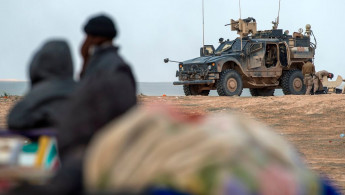UK foreign secretary pledges millions to combat 'the growing threat' of IS groups in Africa
UK Foreign Secretary Dominic Raab will pledge "millions" to fund anti-terrorism efforts in Africa at the Global Coalition Against Daesh conference in Rome on Monday, according to UK government sources.
The meeting - which includes foreign ministers from more than 45 countries - will focus on the growing threat posed by the Islamic State group (IS) in Northwest Africa - including Nigeria, Cameroon, Niger and Chad - where attacks and membership have rapidly increased in recent months.
Raab will offer £12.6 million to support campaigns tackling threats posed by the IS group and finance "longer-term drivers of terrorism, both in the Middle East and in areas of Africa", according to a UK government statement.
"Two years since Daesh's (IS) territorial defeat in Iraq and Syria, the threat of Daesh and its hateful ideology has not gone away," said the UK foreign secretary.
"Worryingly it continues to grow in Africa which is why we must work with our Coalition partners to fight its poisonous propaganda on all fronts."
Raab will also express growing concerns at the meeting about the "fragile security situation" in Iraq and Syria, after a number of attacks on local forces.
Frank Gardner, BBC Security Correspondent, told Radio Four's Today Programme that the coalition had "their work cut out for them" as conditions in Northwest Africa are ripe for IS recruitment.
Gardner said the money offered by the UK was a "drop in the ocean" given the "very big challenge" of combating IS propaganda and the climate of poverty and corruption that is prompting individuals to join the group.
Recently, a spokesperson for IS congratulated members for their attacks in West Africa as part of its global propaganda campaigns.
The Global Coalition of Daesh will be co-hosted by Italy’s foreign minister, Luigi di Maio and attended by US Secretary of State Anthony Blinken.
The US-led military alliance was established in 2014. Since then, 7.7 million people have been "liberated from [IS] rule" according to the UK government.





 Follow the Middle East's top stories in English at The New Arab on Google News
Follow the Middle East's top stories in English at The New Arab on Google News


